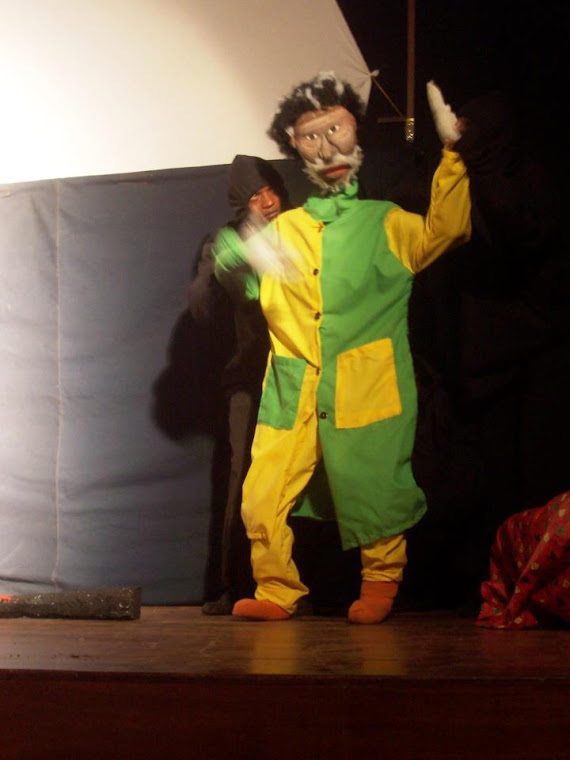PUPPETS FOR THE BLIND IN ERITREA - By Anthony Mboyo
The three Puppeteers traveling to Asmara by flight via Djibouti had one thing in common; they were wondering how to approach the Eritrean Blind community with the concept of Puppetry. The biggest challenge to us actually was how puppetry, being a visual metaphor, would appeal to a visually impairedgroup of participants. On invitation by the Eritrean National Association for The Blind (ERNAB) based in Asmara Eritrea, we were supposed tointroduce the concept of Puppetry in Education to the blind people for them to address issues affecting them.
Background
Eritrea is a country that is trying to recuperate from the devastation caused by an almost 30-year-old war with neighboring Ethiopia, a confrontation that has left many people physically disabled and emotionally distressed withmany still suffering from communicable diseases as a direct result of poverty caused by the war. Blindness is a common disability among the people of Eritrea. A major challenge to the blind people is that most communities lack both theknowledge and attitude to integrate the blind, or visually impaired, people into the social order. A further contributing factor is that there are few existing facilities to provide for the needs of the blind community. This state of affairs gave rise to an urgent need to lay down strategies for advocacy for policy formulation, awareness creation and discussion on matters pertaining to rights of the blind people and other disabled in the country. Puppetry,having been successful as a tool for community mobilization and awareness creation in Kenya, was identified as a potential tool to employ in this intervention. In November 2005, the Community Health Awareness Puppeteers (CHAPS)was invited to travel to Eritrea and conduct a 14 day workshop for ERNAB
The workshop
On arrival at Asmara, contrary to our slender misjudgments, Asmara is one of the modernized cities in Africa with an incredible infrastructure.19 participants had been invited to the workshop, which would later prove to be one of the most challenging workshops I have ever facilitated. We commenced with a capacity assessment of the participants and to our delight, some participants had some little knowledge on theatre. We embarked on an introduction of theatre concept and theories and proceeded to introduce anew concept of Participatory Educational Theatre using puppetry as the discourse of performance.It was no wonder that the introduction to puppetry was well received since this was going to be a new approach topopular education. One important thing to note was hat the visually impaired people tend to be very intelligent and always excel in a field that they undertake to pursue. Without even seeing the objects, they learnt to manipulate puppets and air out issues in scripts with a remarkable commitment. We had some participants who were not blind and played a major role in assisting their blind colleagues in constructionof puppets and general movement within the workshop.At the end of the workshop, two performances were performed touching on the issue of cultural perception towards the blind people and access to education. The discussions that ensued during the final performance were proof that the puppets had opened a new door of dialogue and willingness to embrace the marginalized within the society According top Kflom Weldergebriel, one of the participants who lost his sight in the war, "The puppets have inspired a new vision to the blind people and we hope for a brighter future for the blind people of Eritrea" On departing from Asmara, we left behind an elated people and enthusiastic community theatre practitioners who we indeed know will restore hope in the hearts of many Eritrean families. To crown it all, ERITV the only national television channel aired aspecial program on the overall project.The whole project was just but a beginning to continued partnership between ERNAB and CHAPS and the two countries wouldcontinue to enjoy closer ties with each other.We thank the Netherlands embassy in Eritrea for supporting this worthy course.
As the three puppeteers are flying back to Nairobi via Khartoum smiling, they all have one thought, "It was a challenge worth facing"
For more information on the project contact:
Anthony Mboyo
Program officer CHAPS
Treasurer UNIMA Kenya Chapter
P. O. Box 46042 00100 Nairobi, Kenya
Tel: (254) (20) 2715002, 210705
Fax 254 20 2715115
Email mkasmall@yahoo.com
unima_kenya@myway.com

No comments:
Post a Comment